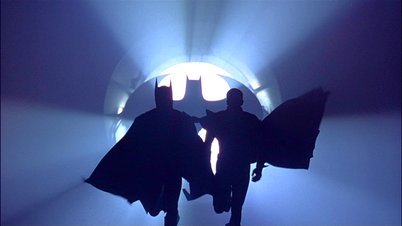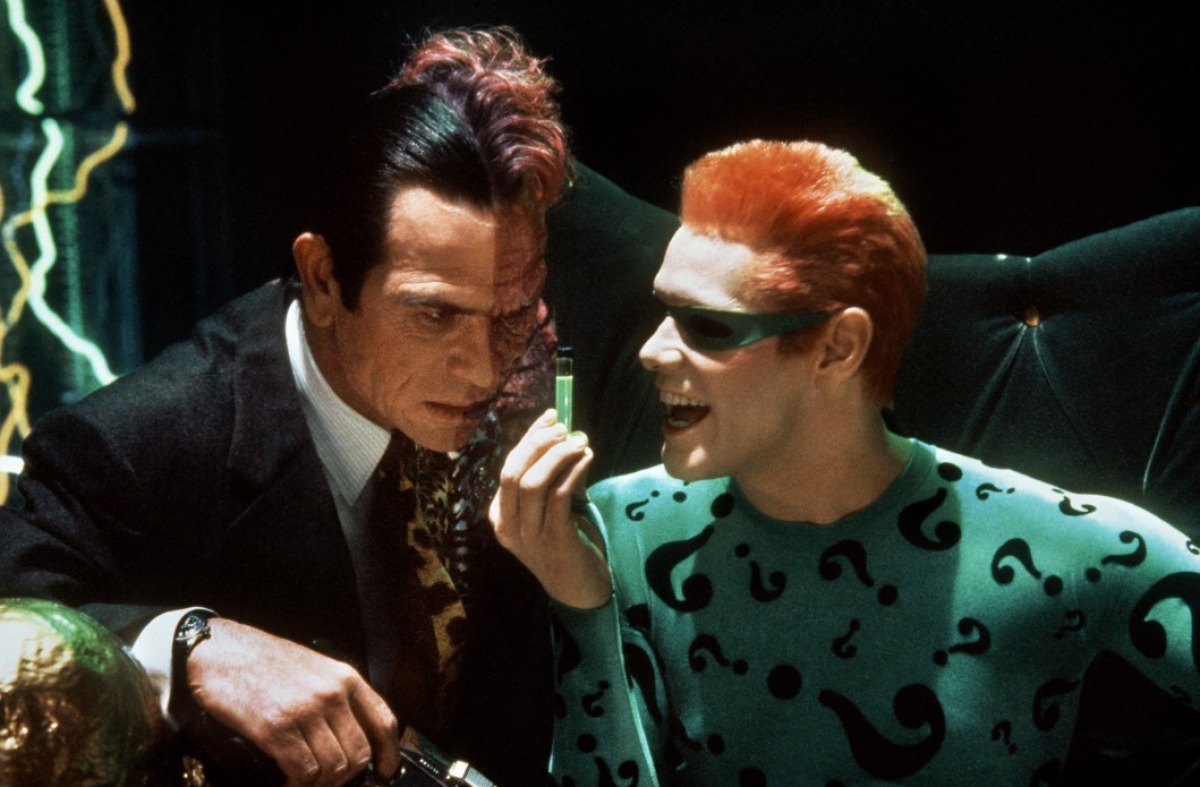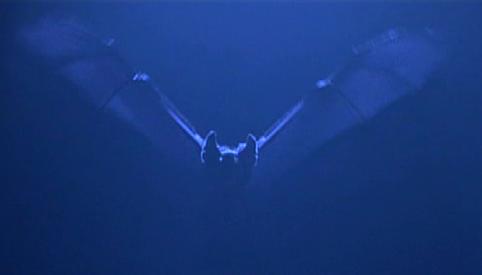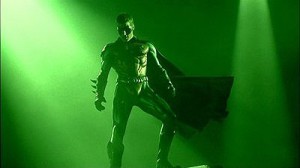June 16 marked the 20th anniversary of Batman Forever's North American release. I was six at the time and Batman Forever was the Batman film for me growing up- a film I watched a lot on VHS. Which isn't a surprise since the film's main goal was to be a more kid friendly film than the previous two films in the franchise, Batman (1989) and Batman Returns (1992)- both directed by Tim Burton. After Batman Returns was criticized for being too dark and grotesque, Warner Bros. felt uneasy about another Burton-directed Bat film. Burton almost did direct the third installment but eventually dropped out ( I wrote about what that film might've been like here:http://whatculture.com/film/tim-burtons-batman-forever-best-dark-knight-movie-never-made.php). Joel Schumacher- known for films such as The Lost Boys, St. Elmo's Fire, and Falling Down- was hired to make a more light, less depressing take on the Batman mythos.
Batman Forever is often lumped in beside Schumacher's follow-up, 1997's Batman & Robin as the low-points of the franchise. But we have to remember that before Batman & Robin put the franchise on ice until Christopher Nolan's Batman Begins in 2005 Batman Forever was received fairly well by audiences. It was more accessible and mainstream than Batman Returns, which is more Burton than Batman film and not really a superhero action film either. Moreover, Forever also out-grossed Returns at the box-office.
The last time I watched Batman Forever before revisiting it for this retrospective was after seeing Batman Begins. Due to being older and having just seen Nolan's darker take on the character, I found myself appreciating Burton's vision more and being disappointed we never got a third film from him; though I still enjoyed Batman Forever. However, seeing the film just recently, I can see it's flaws more clearly.
For one, it's a very tonally awkward film. The scenes featuring Edward Nygma/Riddler (Jim Carrey) and Harvey Dent/Two-Face (Tommy Lee Jones) are very broad and comedic, whereas the scenes with Bruce Wayne/ Batman (Val Kilmer) and Dick Grayson (Chris O'Donnell) are more realistic. I wish Jones had played Two-Face more subtly, particularly since Carrey's performance is flamboyant and over the top enough for ten movies. You needed a straight man in the scenes with Carrey and we never get that with Jones hamming it up like he's playing the Joker.
I also feel Chase Meridian (Nicole Kidman), the psychiatrist Commissioner Gordon (Pat Hingle) brings in to analyze Two-Face, is a little too shallow. To be fair, that's part of her character arc as she's first attracted to Batman but then falls for the man behind the mask, telling Batman a girl eventually has to grow up. The idea of a psychiatrist being Bruce Wayne's love interest, with Bruce's own alter ego being his romantic rival is a great idea that I wished the filmmakers had unpacked more. This plotline highlights the duality of Batman and the superhero archetype in general. Batman isn't just Bruce in a suit but a different persona- both literally and metaphorically. The love triangle between Bruce/Batman/Chase is also reminiscent of the Clark Kent/Superman/Lois Lane relationship in the Christopher Reeve Superman films.
At the film's climax, Riddler (having found out that Bruce is Batman) makes Batman choose between Chase and Dick (now having taken on the mantle of Robin). Nygma was a Wayne Enterprises employee who felt betrayed when Bruce rejected his idea for a box that enables Television signals to beam directly in to a person's brain. "It just raises too many questions," Bruce told him. Riddler wants to make Bruce suffer but he's also fascinated in the riddle of who will eventually win over- Batman or Bruce? Which persona wins out? Batman saves both Robin and Chase, which you can argue is a little too neat. But it pays off when Batman tells Riddler, "I had to save them both. You see, I'm both Bruce Wayne and Batman not because I have to be, now, because I choose to be." Batman is no longer a psychological burden for Bruce but someone he chooses to be. He'll go out and fight crime but he'll be more psychologically and emotionally well rounded.
I do like Val Kilmer's performance. I won't say he's better than Michael Keaton or Christian Bale but I feel he's probably the most underrated of the four actors who've played the character in live action. Supposedly Schumacher wanted to do a adaption of Frank Miller's seminal Batman: Year One, which was an influence on Batman Begins. I've would've liked to have seen Kilmer in a film between that was cross a between Burton's gothic sensibilities and Begins' exploration of Bruce's psyche.
I do like Val Kilmer's performance. I won't say he's better than Michael Keaton or Christian Bale but I feel he's probably the most underrated of the four actors who've played the character in live action. Supposedly Schumacher wanted to do a adaption of Frank Miller's seminal Batman: Year One, which was an influence on Batman Begins. I've would've liked to have seen Kilmer in a film between that was cross a between Burton's gothic sensibilities and Begins' exploration of Bruce's psyche.
More so than Burton's films, Schumacher does attempt to explore the motivation behind his crusade as Batman. There is a deleted scene where Bruce remembers reading his father's diary after his parents' murder. On the night they were murdered, Bruce's father wrote his in diary he and his wife went out that night because Bruce really wanted to go see a movie. Thus guilt was a large incentive for him to dawn that suit and battle crime. I feel this deleted scene should never have been cut, since it adds more depth to Bruce's character and makes his becoming Batman more understandable. The flashback to young Bruce encountering the bat in the cave is a striking scene, nightmarish but Bruce's narration also reflects how terror can also inspire us to do great things.
Another character revealing moment- this one in the film- is when Bruce and Dick are talking about the nature of revenge. Dick is dead set on killing Two-Face for the murder of his parents. Dick is taken in by Bruce and eventually discovers that Bruce is Batman. Bruce tells Dick that after he kills Two-Face, the pain won't go away. He'll keep going out to find another "face" each night until revenge becomes his entire life. Dick says Bruce couldn't understand because his parents weren't killed by a maniac, to which Bruce replies, "They were."
This exchange reads to me like the most direction connection- aside from Gordon and Alfred (Michael Gough) reprising their roles from the Burton films- that this film is still connected to the previous films. In Burton's Batman, Bruce's parents were killed by Jack Napier (Jack Nicholson) years before he became the Joker (a maniac). And Batman did kill Joker at the end of that film. So, Bruce does get revenge but he still has to go out each night. Revenge hasn't changed anything.
Despite having these connections to Burton's films, in other ways Batman Forever was a reboot before the word became a staple in Hollywood. Gotham City looks and feels completely different from Burton's, we have a distinctly different tone and direction for the franchise. This film isn't a hard reboot like Batman Begins but it's closer then other franchise installments got to a full on revamp until Nolan's film. Batman Forever came out the same year as Gdeneye, Pierce Brosnan's first outing as James Bond. Goldeneye-like Batman Forever- isn't a complete reset but it did set out to shift the direction of the franchise. Furthermore, Bond got his own Batman Begins the following year in 2006- Casino Royale.
Coming back to the Bruce/Dick relationship, I think the problem with his arc is he gets everything he wants. He's persistent in wanting to be Bruce's partner and despite Bruce being adamant about working alone and wanting Dick to lead a normal life, He eventually has to put aside those reservations and team up with Dick. It feels like Bruce isn't really given a choice, rather then reaching his acceptance of Dick as a partner organically. And while Dick doesn't kill Two Face personally, he gets the satisfaction of seeing him die when Batman causes Two- Face falls to his death.
While I've grown to prefer Burton and Nolan's film to Schumacher's take, Batman Forever gave me cinematic Batman I highly enjoyed and that's what matters. And in an age where superhero films can feel very "assembly line" Schumacher crafts a flamboyant mixture of comic book, camp, darkness and sex, a film that owes something to Adam West and Frank Miller. It doesn't completely work but it- and Batman & Robin- remain fascinating pop culture products of their time.



